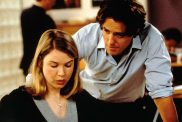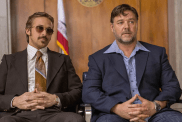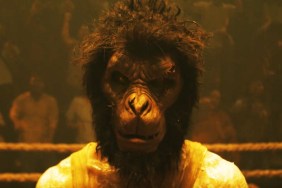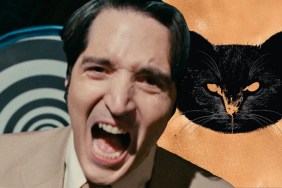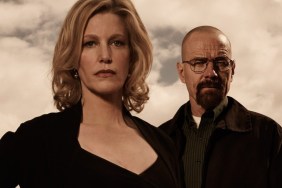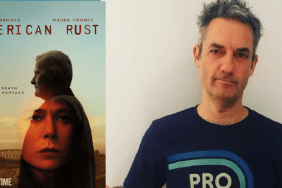Director Roger Michell first came to prominence when he directed Notting Hill, starring Julia Roberts and Hugh Grant, in 1999, and since then he’s gone on to direct as disparate films as Changing Lanes, Venus and Morning Glory.
His new movie is Hyde Park on Hudson, a film starring Bill Murray and Laura Linney as Franklin Delano Roosevelt and his distant cousin Daisy, the two of whom bond at the President’s upstate New York mansion where he goes to relax. At the same time, the King and Queen of England, played by Sam West and Olivia Colman (The Iron Lady), are coming to visit the President at his Hyde Park estate to try to get some aid in their war with Germany which had just begun.
What’s interesting about the latter part of the film, is that this is the same King and Queen played by Colin Firth and Helen Bonham Carter in Tom Hooper’s Oscar-winning The King’s Speech. Since the last time ComingSoon.net spoke to Michell was just before that movie came out, we decided to start our interview by asking about those parallels.
ComingSoon.net: I remember the last time I spoke to you, which was a couple of years ago for “Morning Glory,” which was actually the same day I was doing interviews for “The King’s Speech,” so it’s interesting to see you making a movie which features the same characters. Is that a complete coincidence and had you already been thinking about doing this project back then?
Michell: Yeah, we started talking about this project probably five or six years ago. This was originally before I did “Morning Glory.” In fact, this is a radio play written by Richard Nelson for the BBC, which was broadcast I think about five years ago, so we did, for the record, predate “The King’s Speech” by two, three years in terms of starting to get this film developed and getting it funded, etc. Then “The King’s Speech” came along and sort of took the world by storm, and it obviously was disquieting for us to see such a good film on such a similar subject do so well. I think we all feel now that it will work both ways for this film. In some ways, it’s bad because it looks like it’s sort of a cynical piece of opportunity, which it isn’t, because we really made this film in spite of “The King’s Speech” not because of “The King’s Speech.” In another way, I think it’s good because “The King’s Speech” lays a lot of the ground for enjoying this film, and you could easily argue that “The King’s Speech” is a brilliant trailer for “Hyde Park on Hudson.”
CS: Did it actually help get this movie made?
Michell: Yeah, I don’t know. I think you’d have to ask the financiers that. I mean, there were some misgivings about the huge success of “The King’s Speech,” but in other ways, I think may be it was an advantage that made people think that these characters were attractive and people were interested in them. People are still interested, it appears, in stories about the Royal Family.
CS: I feel like having that movie may make it easier for Americans who may not have been familiar with King George before that.
Michell: Yeah, exactly, yeah. I mean, it is a kind of prequel. One of the things we did when “The King’s Speech” was released to such acclaim and such popularity was to go back and look at our script and readjust our script on the assumption that all the characters in our story had seen “The King’s Speech” so that all the information that was contained in “The King’s Speech,” we don’t feel we have to retell in this film. There was more material in our film about the king’s speech impediment and about his attempts to his linguistic tongue-twisting exercises, etc., all of which he did at Hyde Park, but we removed those sections which seemed to be repeating the story which had already been told.
CS: Were you involved with the radio play as well?
Michell: No, not at all. Nor did I hear it actually.
CS: Ah, so you knew it had been put on before as a radio play, but that didn’t influence you to make the movie.
Michell: No, I read the script before the radio play was broadcast, but I thought it would be probably bad for me to listen to the radio play because I didn’t want to kinda stain my susceptibility to the text by hearing someone else do it. It’s a silly thing but

CS: Did Richard have the intention to do it on stage as well?
Michell: I don’t think so. I don’t think it would really work on stage. I think it worked perfectly on radio because radio can shift locations as effortlessly as a movie can. The radio play is interesting, though. It has an older version of Daisy in it, so you had two Daisies, one speaking retrospectively, and one speaking in the present tense as a narrator. The only remains of that idea in our film is when Daisy shouts at the President and then says, “But I didn’t say that. All I said was this.” Actually in early drafts of the film, we played with the idea of having an older Daisy lurking around in the back of a shot making wry ironic comments on the action that was in front of her, but it felt too arched, too clever, and we removed it.
CS: One of the interesting thing about your movies is that you alternate between movies set in America and England and this one gave you the chance to combine those two things. Were you at all worried about tackling something that was historical but also somewhat fictional?
Michell: Yeah, you obviously do worry about this kind of thing, but it’s not a biopic. It’s the illumination of a tiny footnote, a footnote of a footnote, in a way. I suppose I found that charming about it, that it is a construction. There’s lots of conflation and lots of invention to squeeze these two stories into this one weekend. I’m keen though that it’s not taken too literally as a history lesson because its ambition is not to be “this really happened,” it’s ambition is to be “a version of this could have happened and we’re going to make a fiction about it.” I found the way in which Richard managed to collide these two stories very ingenious and very surprising and unexpected. I’ve worked a lot with Richard over the years. We worked nearly 25 years together in theater and nearly all of his plays, many anyway, certainly the plays I’ve directed by Richard, they’re all focused at some level on this strange love, hate, tense relationship between America and England, both historically and in the present. This sort of combination of adoration, envy, resentment, snobbery, one-upmanship, which seems to inform our dealings with each other, it’s really fascinating and for England in particular, it’s very much a part of the last 100 years of our history.
CS: Obviously a lot of stuff that happens in the movie, the only person who would’ve been there was Daisy and FDR. Did she write a lot about that in her letters that Richard was able to take from or was it matter of figuring out from what she wrote what may have happened?
Michell: Yeah, I think it’s more the latter than the former. I mean, her letters are not comprehensive in that they’re charming and they’re filled with clues to an intimacy between her and the President, but she also didn’t leave all the letters and she often removed sections from her diary. Obviously, it’s fascinating to imagine what might have been the elements that she decided to destroy in terms of her record of her relationship with the President. But the basis for the weekend is certainly there. The King and Queen did go there in July 1939, and many of the events in the film took place.
CS: Since you’ve worked with Richard so much in the past, when you decided to make this movie together, was he also involved with the casting?
Michell: Well, I always like to involve writers as much as possible to consult, but he was over here and I was over there, so I couldn’t consult on a similar process, but certainly casting Bill (Murray) was a big decision for all of us and a difficult thing to achieve because Bill was so hard to pin down and so hard to get a hold of. It was quite a rare thing for me, because I decided pretty early on that I didn’t really want to make the film with another actor apart from Bill. I mean, usually you have your first choice and then you have a backup or two. If the first guy didn’t want to do it, then you think, “Okay, I’ll reconfigure this in another way and I’ll do it with this guy.” I found myself feeling increasingly with this film that although I had a strong short list of outstanding American actors at the right age and the right class and the right type, that without Bill, the film would’ve become off-balance. There’s something so mischievously forgivable about Bill. I didn’t want it to turn into this sort of Dominick Strauss-Kahn story, if you follow me, or even the Bill Clinton story. Bill (Murray’s) charm carries the day, and I think FDR’s charm is very much the same thing.
CS: I can’t imagine any other actor playing the role in this movie, because Bill Murray is so distinctive with what he does and how he does it and it’s a great performance from him. We’ve never really seen him play a real person before.
Michell: Yeah, he doesn’t normally play someone so different from himself, and he really took the trouble to do the work and immerse himself in this, and he’s done really well. I hope he does very well out of the film, and I think he will.

CS: As far as casting King George and Elizabeth, considering you had two previous versions, how did you end up with Olivia Colman and Sam West.
Michell: It’s tricky. When the person who’s just played that role has won an Oscar and everybody seems to feel he owned the part, but it’s like “Hamlet.” There are lots of different versions, and I was very pleased to get those two, and they’re playing different characters as well. “The King’s Speech” is a different fiction, if you like, from our version. You just embrace the difference and you encourage the actors as they did to express themselves with particularity and I think they had fun with that and I think they’re wonderful in the film.
CS: This is a very different movie than “Morning Glory” and different from “Venus” and “Changing Lanes.” Is there a common way you approach making a movie or working with the actors in rehearsal?
Michell: Yeah, I do. I mean, that’s one of the few common things about all these films, is that I do like to rehearse properly. My excuse to rehearse is because that’s my background as a theater director. I find that a proper rehearsal period liberates the actor and it makes them feel able to push the boat out in a way that perhaps they wouldn’t if they were just meeting on the set or arriving on the set and making it up from there. That’s simply my way of doing it, but it’s not the only way of doing it. There are films with great performances made by directors who don’t want to rehearse or think rehearsal is actually counterproductive and it will kill spontaneity, etc. It’s sort of just a different approach, but it’s just the tradition I come out of, I guess.
CS: I have to ask you about the hot dog scene, because it’s been talked about a lot. It draws very cheeky parallels to the earlier scene between Daisy and FDR, and I don’t know but that might have been a factor in getting an R-rating.
Michell: (Laughs)
CS: Obviously that couldn’t have been in the radio play, so can you talk about how you presented that scene to the actors?
Michell: I mean, I think that’s very perceptive of you to realize that there is a kind of passion in the film and it begins and ends with a hot dog, in a way. This hot dog that ends the film is a special object. It is an object which ridiculously has so much symbolism attached to it that at the time, people did really make quite a big fuss of the fact that this king, this aristocrat, this noble, glorious king of the realm would actually put such a democratic food stock in his mouth. I think that history is made with such tiny gestures, and it is the moment in our film where all the stories conjoin. I think it’s funny and charming and strangely satisfying. The King that day really did coin the phrase “this special relationship,” this phrase which is still very much to represent the special relationship between the countries.
CS: When I spoke to Laura Linney, she also mentioned that the hot dog was created in Germany, which also adds something to that scene.
Michell: Exactly. It’s a bratwurst type of thing, and here it is as the kind of inspiration for what eventually becomes a war against them.
CS: Is it true, you’re already preparing your next movie?
Michell: Yeah, I start shooting in about three weeks. Yeah, it’s a little film by Hanif Kureishi who wrote “The Mother” and “Venus” and this is our third or fourth collaboration and it’s a film set in Paris called “Le Weekend.” It’s about a couple who go there to celebrate their 25th wedding anniversary, played by Jim Broadbent and Lindsay Duncan. They explore their marriage. Their kids have now just grown up and left and they’re trying to figure out whether there’s anything left in their marriage. They meet an old college buddy of Jim’s played by Jeff Goldblum, and it’s like “Venus.” It’s a very small, funny, complicated, dark film, which I’m looking forward to.
CS: How long will you be in Paris shooting that?
Michell: I’m only be there for four weeks – we’re doing it quick, quick, quick.
Hyde Park on Hudson opens in select cities on Friday, December 7. You can read our earlier interview with actress Laura Linney here.
